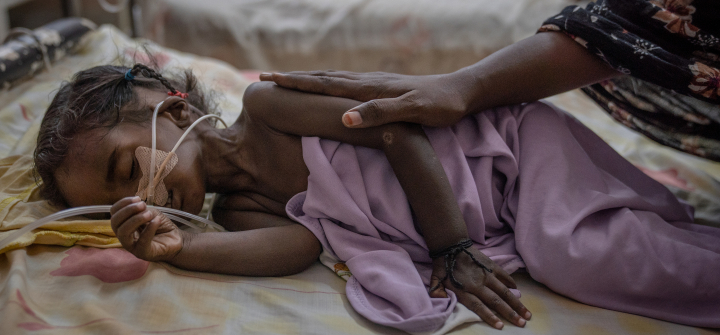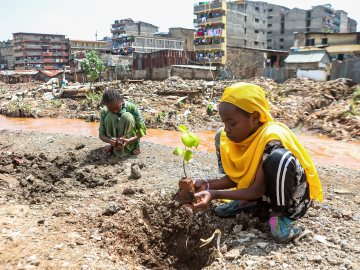Scarred by War, Saved by Care: Reviving Pediatric Health in Sudan
In Sudan, childhood has become a casualty of war.
The war that erupted between rival forces in April 2023 has spiraled into a humanitarian emergency. Violence, displacement, and hunger have pushed the health care system to the brink of collapse, leaving widespread famine, shuttered clinics, and malnutrition wards stretched beyond their limits.
Sudan’s children have suffered the most. Some 15 million children now need humanitarian aid. This year, 3.2 to 4 million Sudanese children under age 5 will face life-threatening malnutrition. Children enduring severe malnutrition face an 11X increased risk of mortality compared to a well-nourished child.
Reviving pediatric care in Sudan is more than just a humanitarian priority; it is a test of whether the world will protect the future of Sudanese children during one of the worst wars of our time.
Al-Fasher, the capital of North Darfur, represents a particularly alarming example of this national tragedy. The siege imposed by the Rapid Support Forces militia since April 2023 has drastically obstructed humanitarian aid efforts. Eleven percent of children under 5 there suffer from severe acute malnutrition, while 40% are affected by acute malnutrition. While exact numbers are not available, many children are hospitalized in critical condition. Some await treatments that medical facilities cannot provide. Earlier this year, UNICEF made brief relief deliveries; however, ongoing attacks and blockades prevent sustained assistance.
The crisis is exacerbated by ongoing assaults on health facilities across the country that have closed key hospitals and pediatric units. This has hindered access to critical vaccinations, antibiotics, oxygen therapy, and therapeutic food. Preventable diseases such as measles, polio, and cholera have soared. More than 83,000 cholera cases and 2,100 deaths, primarily among under-5 children, have been recorded in the past 12 months. Shortages of clean water, medicine, and food are turning treatable illnesses into deadly emergencies.
Violence against children threatens more than their physical health. Forced recruitment and sexual violence continue to occur, with deep emotional scars that last into adulthood. The absence of mental health and psychosocial support services leads to unaddressed trauma in children, increasing their risk of enduring harm.
Amidst these challenges, UNICEF, the WHO, and local partners are working to re-establish critical health services, fortify nutrition programs, and provide psychological support to children. Schools are resuming operations while prioritizing safety, education, and a return to normalcy.
Developed countries and international organizations must immediately step up to stabilize the situation and build back pediatric health infrastructure. First, the UN and African Union must promptly establish a ceasefire and set up humanitarian corridors to assist UNICEF, WHO, and Sudan’s Ministry of Health in resuming immunizations, expanding mobile clinics, and providing therapeutic nutrition. Medium-term needs include rebuilding hospitals and training pediatric staff, supported by virtual mentorship and diaspora engagement to enhance local capacity. Guaranteed, sustained humanitarian access with community leadership will improve trust and the delivery of vital services. Incorporating psychosocial support for children, families, and health care professionals will enhance resilience.
A significant financial investment is necessary, as is a reaffirmation of commitment by donor nations. They must protect Sudan’s children because it is both a moral obligation and a critical requirement for regional stability.
The resilience of Sudanese children in the unfolding national tragedy represents a source of hope in the midst of profound tragedies. Every child in Sudan has the right to not only survival but also to schooling, play, and dreams—all of which have been stripped away by war and must be swiftly restored to heal a generation and build a peaceful future.
Habab Iraqi, MBBS, is a Sudanese emergency medicine intern, now based in Saudi Arabia. Current affiliations include SAEM, IFEM, and EUSEM.
Join the 50,000+ subscribers in 170+ countries who rely on Global Health NOW summaries and exclusive articles for the latest public health news. Sign up for our free weekday newsletter, and please share the link with friends and colleagues.
Two-year-old Riham Ata, who was admitted from a recently liberated area of Khartoum, lies on a gurney in one of Al-Buluk Hospital's severe malnutrition wards, in Omdurman, Sudan, on April 26, 2025. Giles Clarke/Avaaz via Getty





